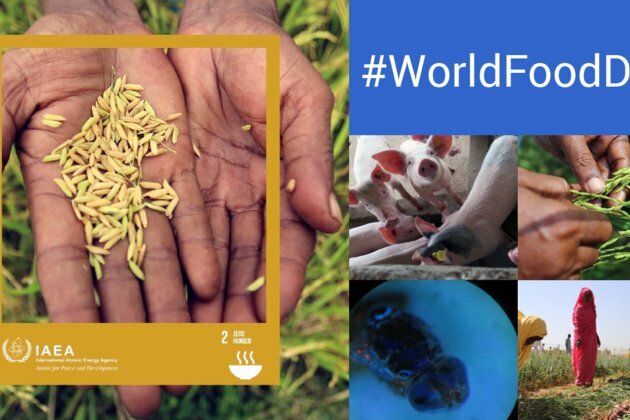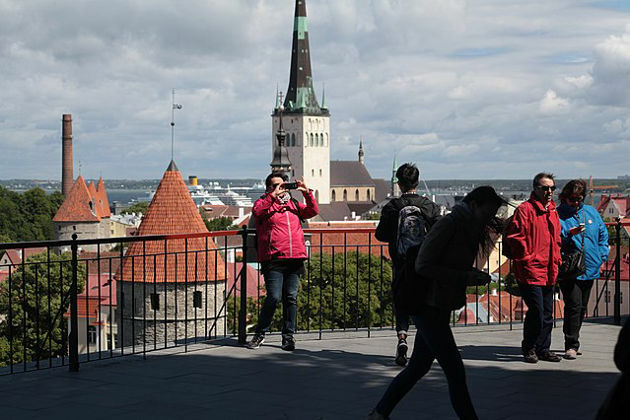From Field to Table: Nuclear Techniques Toward Zero Hunger
International Atomic Energy Agency
16 Oct 2019, 17:37 GMT+10

Food insecurity - the lack of regular access to nutritious and sufficient food - affects around 2 billion people worldwide, particularly those in low- and middle-income countries. At the same time, climate change continues to threaten the global food supply, taking a toll on rural livelihoods and contributing to a rapid loss of biodiversity for food and agriculture.
Today on World Food Day, the IAEA, in cooperation with the Food and Agriculture Organization of the United Nations (FAO), shares some examples of how nuclear science can help counteract food insecurity and the effects of climate change, while making food more accessible and affordable.
Protecting animals and encouraging productivity
Healthy, productive animals are important for a country's livestock industry and food security. Nuclear and nuclear-derived techniques can help to boost livestock productivity and protect animals from diseases.
When the African Swine Fever (ASF) spread last year to Viet Nam - where pork makes up roughly three quarters of total domestic meat consumption - a nuclear-derived technique for the rapid diagnosis of animal diseases helped to control the spread of the disease. In Ghana, fast nuclear-derived diagnostic techniques helped local scientists to contain the spread of ASF and avian influenza in the region.
Through nuclear techniques, scientists can screen and choose animals with the highest productivity for breeding to increase the availability of animal products such as milk and wool.
Healthy crops, healthy people
To ensure food is available and accessible, crops must be able to grow in increasingly extreme weather conditions and be protected from various threats such as disease. Nuclear and related techniques can be used to develop crops that are more disease-resistant and tolerant to harsh climates, such as a new sorghum variety for African farmers. They can also be used to develop nutrient-rich crops to address chronic micronutrient deficiencies affecting large parts of the population in countries such as Sierra Leone.
In some countries, nuclear science helps farmers optimize their water, soil and fertilizer use to boost crop yields and conserve resources. In Mauritania, increased crop diversity and better yields are key outcomes of using drip irrigation systems, which provide crops with the right amount of water and fertilizer at the right time.
Keeping food safe and fresh
While higher yielding crops may mean more food, that food needs to be kept safe at each step of the way to ensure it stays accessible and affordable. In countries like Argentina, the nuclear-based sterile insect technique (SIT) has been used to successfully control a devastating fruit fly pest that destroys stone fruits such as peaches and plums. Scientists in Morocco have been using SIT in an ongoing campaign to suppress the Mediterranean fruit fly and are now expanding its use to protect the entire country's citrus production, particularly in the Agadir region.
Using the same technique, Latin American countries have started working with the IAEA and its partners to prevent the re-introduction of the New World screwworm into Central and North America, which affects livestock production and threatens human health. In Senegal, suppression of blood-sucking tsetse flies using SIT has helped to reinvigorate livestock reproduction and boost milk and meat yields.
While SIT can help prevent pests from damaging crops and the health of livestock, food irradiation can also be used to prevent insects from spreading through exports. Irradiation is also being used to minimize the risk of food-borne illness and to keep food fresher longer. Cuba has recently revived its food irradiation services to protect its fruit supply and help boost food security.
To help ensure food safety, countries like Costa Rica are using nuclear techniques to analyse samples of food like beef and pork to detect contaminants, such as pesticides, heavy metals, and veterinary drug residues. This has helped guarantee that their food products are safe to eat and meet market standards to stay competitive.
 Share
Share
 Tweet
Tweet
 Share
Share
 Flip
Flip
 Email
Email
Watch latest videos
Subscribe and Follow
Get a daily dose of Irish Sun news through our daily email, its complimentary and keeps you fully up to date with world and business news as well.
News RELEASES
Publish news of your business, community or sports group, personnel appointments, major event and more by submitting a news release to Irish Sun.
More InformationInternational
SectionTravelers can now keep shoes on at TSA checkpoints
WASHINGTON, D.C.: Travelers at U.S. airports will no longer need to remove their shoes during security screenings, Department of Homeland...
Rubio impersonator used AI to reach officials via Signal: cable
WASHINGTON, D.C.: An elaborate impersonation scheme involving artificial intelligence targeted senior U.S. and foreign officials in...
Warsaw responds to migration pressure with new border controls
SLUBICE, Poland: Poland reinstated border controls with Germany and Lithuania on July 7, following Germany's earlier reintroduction...
Deadly July 4 flash floods renew alarm over NWS staffing shortages
WASHINGTON, D.C.: After months of warnings from former federal officials and weather experts, the deadly flash floods that struck the...
Putin fires transport chief, later found dead in suspected suicide
MOSCOW, Russia: Just hours after his sudden dismissal by President Vladimir Putin, Russia's former transport minister, Roman Starovoit,...
Thousands gather in Himalayas as Dalai Lama celebrates 90th birthday
DHARAMSHALA, India: The Dalai Lama turned 90 on July 6, celebrated by thousands of followers in the Himalayan town of Dharamshala,...
Europe
SectionIrish Rail faces 26,000-euro bill after graffiti spree by man
DUBLIN, Ireland: Irish Rail incurred over 26,000 euros in damages due to a series of graffiti incidents carried out by a 24-year-old...
Warsaw responds to migration pressure with new border controls
SLUBICE, Poland: Poland reinstated border controls with Germany and Lithuania on July 7, following Germany's earlier reintroduction...
Ireland’s PM ‘hopeful’ of EU-US tariff deal before July 9 deadline
DUBLIN, Ireland: Taoiseach Micheál Martin has expressed cautious optimism that the European Union and the United States can strike...
Fans perform WWII-era Fascist salute at Marko Perković’s mega concert
ZAGREB, Croatia: A massive concert by popular Croatian singer Marko Perković, known by his stage name Thompson, has drawn widespread...
Ireland’s citizens undeterred as Europe swelters in record heat
DUBLIN, Ireland: Despite extreme heat gripping much of mainland Europe, Irish holidaymakers are pressing ahead with their travel plans,...
Beijing hits back at EU with medical device import curbs
HONG KONG: China has fired back at the European Union in an escalating trade dispute by imposing new restrictions on medical device...












